Research Activities
The Atlantic and Gulf Rapid Reef Assessment (AGRRA)
The Atlantic and Gulf Rapid Reef Assessment (AGRRA) Program is an international collaboration of scientists and managers aimed at determining the regional condition of reefs in the Western Atlantic and Gulf of Mexico. The rapid assessment protocol was a one-time assessment to evaluate the condition of a reef taking into account the dynamic relationship between corals, algae and fishes. The AGRRA protocol was applied to a number of sites along the north coast on Jamaica over a two week period in August 2000 and the results showed that the reefs along the north coast remained in a degraded state.
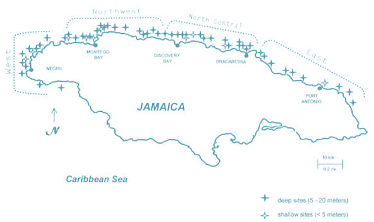 AGRRA Sampling sites
AGRRA Sampling sites
Caribbean Coastal Marine Productivity (CARICOMP) Program
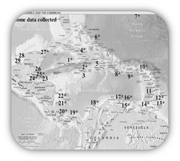 Participating institutions throughout the Wider Caribbean
Participating institutions throughout the Wider Caribbean The CCDC archives data for CARICOMP from institutions throughout the Wider Caribbean that have been collecting since 1993. The datasets includes percentage coral cover, sea urchin density, gorgonian density, seagrass (growth, biomass and leaf area), mangrove forest structure and productivity, sea water temperature, salinity and clarity as well as daily maximum and minimum air temperature and rainfall. Two main publications of CARICOMP are: "CARICOMP-Caribbean coral reef, seagrass and mangrove monitoring sties" (1998) and "CARICOMP -Caribbean Coastal Marine Productivity Program:1993-2003" (2004).
Coral Diseases
Diseases of corals and other organisms are having significant negative impacts on the structure and appearance of coral reefs. The incidences of coral diseases and bleaching are strongly believed to be increasing. Through funding from UNEP, initial surveys were conducted throughout the Caribbean, involving various countries from the CARICOMP Network; Barbados, Colombia, Dominican Republic, Jamaica, Puerto Rico (Mona Island) and Trinidad and Tobago.
The disease surveys were carried out using one of two protocols outlined in the CARICOMP Manual. These surveys were conducted so as to assess the occurrence (incidences at the population levels) and local/geographic distribution of coral and octocoral diseases across the wider Caribbean region. The results were summarized and documented in a comprehensive report edited by Ernesto Weil.
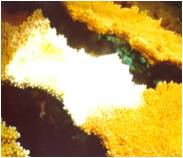 Black band disease on
Black band disease on D. strigosa
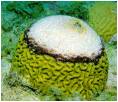 White band disease on
White band disease on A. palmata
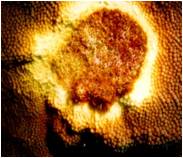 Yellow band disease on
Yellow band disease on M. annularis
The Integrating Watershed and Coastal Areas Management (IWCAM) Project
The Integrating Watershed and Coastal Areas Management (IWCAM) Project in Caribbean Small Island Developing States (SIDS) commenced in 2005 and included thirteen (13) participating SIDS. The main implementing agencies for this GEF (Global Environment Facility) project were the United Nations Environment Programme (UNEP) and the United Nations Development Programme (UNDP).
The National Environment and Planning Agency (NEPA) was the local implementing agency for the Demonstration Project in Jamaica. Under the auspices of the Environmental Management Committee of the Drivers River Watershed Management Project a survey was carried out to gather information on the current status of the reefs in eastern Portland to provide up to date data for management action.
The survey was conducted at fourteen (14) coral reef sites along the eastern coastline of Portland during the period July 15 to 24, 2009. The analysis of the data and the report preparations was carried out by the CCDC on the request of NEPA/GEF‐IWCAM project. In addition, a booklet entitled “Benthic Community Identification for the Drivers River Watershed” was produced.
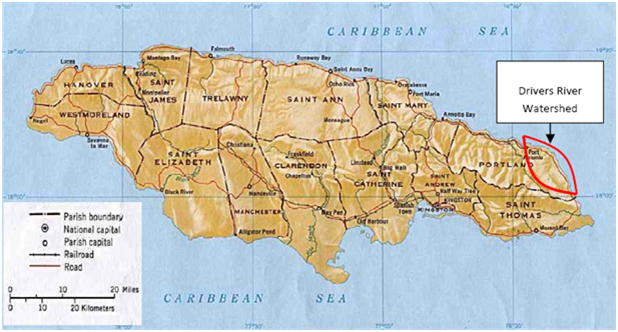 Drivers River Watershed located in east Portland
Drivers River Watershed located in east Portland
The Global Coral Reef Monitoring Network (GCRMN)
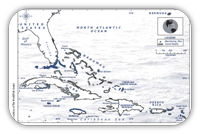 Countries of the Northern Caribbean and Atlantic Node
Countries of the Northern Caribbean and Atlantic Node The CCDC acts as the coordinator of the Northern Caribbean and Atlantic Node of the GCRMN and encourages increased coral reef monitoring and reporting on the status of reefs in the eight countries that fall within the node: The Bahamas, Bermuda, Cayman, Cuba, Dominican Republic, Haiti, Jamaica and the Turks and Caicos Islands. The CCDC has compiled and submitted to the GCRMN reports on the status of coral reefs within the node countries. The CCDC also contributed to GCRMN publication “Status of Caribbean Reefs after Bleaching and Hurricanes in 2005” published in 2008.
Jamaica Coral Reef Monitoring Network (JCRMN)
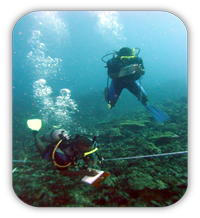 Monitoring at Boscobel on the north coast of Jamaica
Monitoring at Boscobel on the north coast of Jamaica On June 27, 2003, the local arm of GCRMN, Jamaica Coral Reef Monitoring Network (JCRMN) was launched by the CCDC. The aim of the JCRMN is to coordinate the monitoring of coral reefs and associated ecosystems in Jamaica and to improve the availability of data and information on the status of coral reefs. The network consists of agencies, institutions, organizations and individuals involved in coral reef monitoring, research and/or management. Since its inception the JCRMN has acquired funding to conduct training and monitoring at sites around Jamaica as well as in Haiti and the Turks and Caicos Islands.
Reef Check
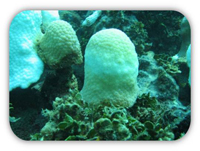 Bleached Montastrea annularis at Drunkenmans Cay
Bleached Montastrea annularis at Drunkenmans Cay REEF CHECK was adopted as one of the monitoring techniques that could provide assessments of the coral reefs around the island. The CCDC was able to utilize marine scientists and recreational divers from the UWI and JCRMN to carry out the monitoring. As a member of REEF CHECK, the CCDC received funding to conduct assessments of the extent of bleaching as a result of the 2005 bleaching event, and the subsequent recovery of corals in the coastal waters of Jamaica.
Coastal Water Quality Improvement Project (CWIP)
The Coastal Water Quality Improvement Project (CWIP) was a 6-year bilateral development initiative between the Government of Jamaica (through the National Environment and Planning Agency, NEPA - the then NRCA) and the United States Agency for International Development (USAID) designed to protect and improve the environmental quality of the country's coastal waters. CWIP commenced activities in January 1998 focusing on three work sites, Negril, Ocho Rios and Port Antonio. Activities are focused in five areas:
- Support community-based initiatives to address environmental concerns;
- Improve the operation and maintenance of municipal wastewater management systems;
- Improve environmental practices of industries and commercial establishments;
- Establish NGO-government partnerships to monitor coastal water quality; and
- Support improved coordination of coastal zone management activities.
The CCDC houses the dataset from the coastal water quality monitoring program. CCDC has also designed a database to store fish catch dataset collected through the Discovery Bay Marine Laboratory and CWIP. The dataset include fish species, number of fish caught, weight, length and fishing gear used.
Caribbean Planning for Adaptation to Global Climate Change (CPACC) Project
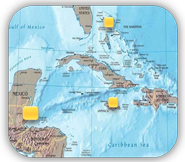 Pilot countries under the CPACC Project: The Bahamas, Belize and Jamaica
Pilot countries under the CPACC Project: The Bahamas, Belize and Jamaica
The Caribbean Planning for Adaptation to Global Climate Change (CPACC) Project began in 1998 and sought to assist Caribbean countries to prepare for and cope with the adverse effects of global climate change.
Coral reef data, using the video monitoring protocol, were collected in 2000 from three pilot countries (The Bahamas, Belize and Jamaica) under Component 5 and are archived at the CCDC. Jamaica, through the National Environment and Planning Agency (NEPA) has continued monitoring after the project ended in 2001. These data are processed and analysed at the CCDC.
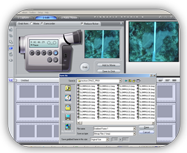 Non-overlapping images were captured using specialized software
Non-overlapping images were captured using specialized software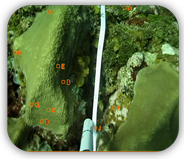 Ten random dots were placed on
Ten random dots were placed on the images and the underlying substrate identified
Mainstreaming Adaptation to Climate Change (MACC) Project
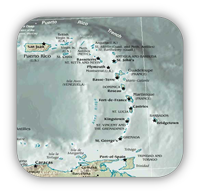 OECS and Tobago.
OECS and Tobago. The CCDC, under a MOU with the MACC Project, coordinated the expansion of the CPACC coral reef monitoring programme to the OECS and Tobago.
Technical support was provided in the form of training, supervised monitoring, data processing & analysis and report preparation. Sixteen participants from 7 countries were trained during the period September 10-13, 2007 in St Lucia.
Monitoring in the OECS and Tobago took place during the period September to April 2008 and September 2008-March 2009. Participating countries included Antigua & Barbuda, Dominica, Grenada, St. Kitts & Nevis, St. Lucia, St. Vincent & the Grenadines, and Trinidad & Tobago.
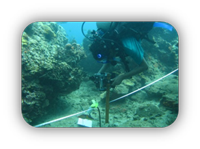 Monitoring in St Vincent
Monitoring in St Vincent
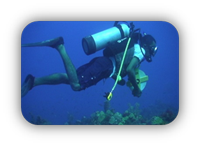 Monitoring in St Kitts
Monitoring in St Kitts Training in St. Lucia
Training in St. Lucia